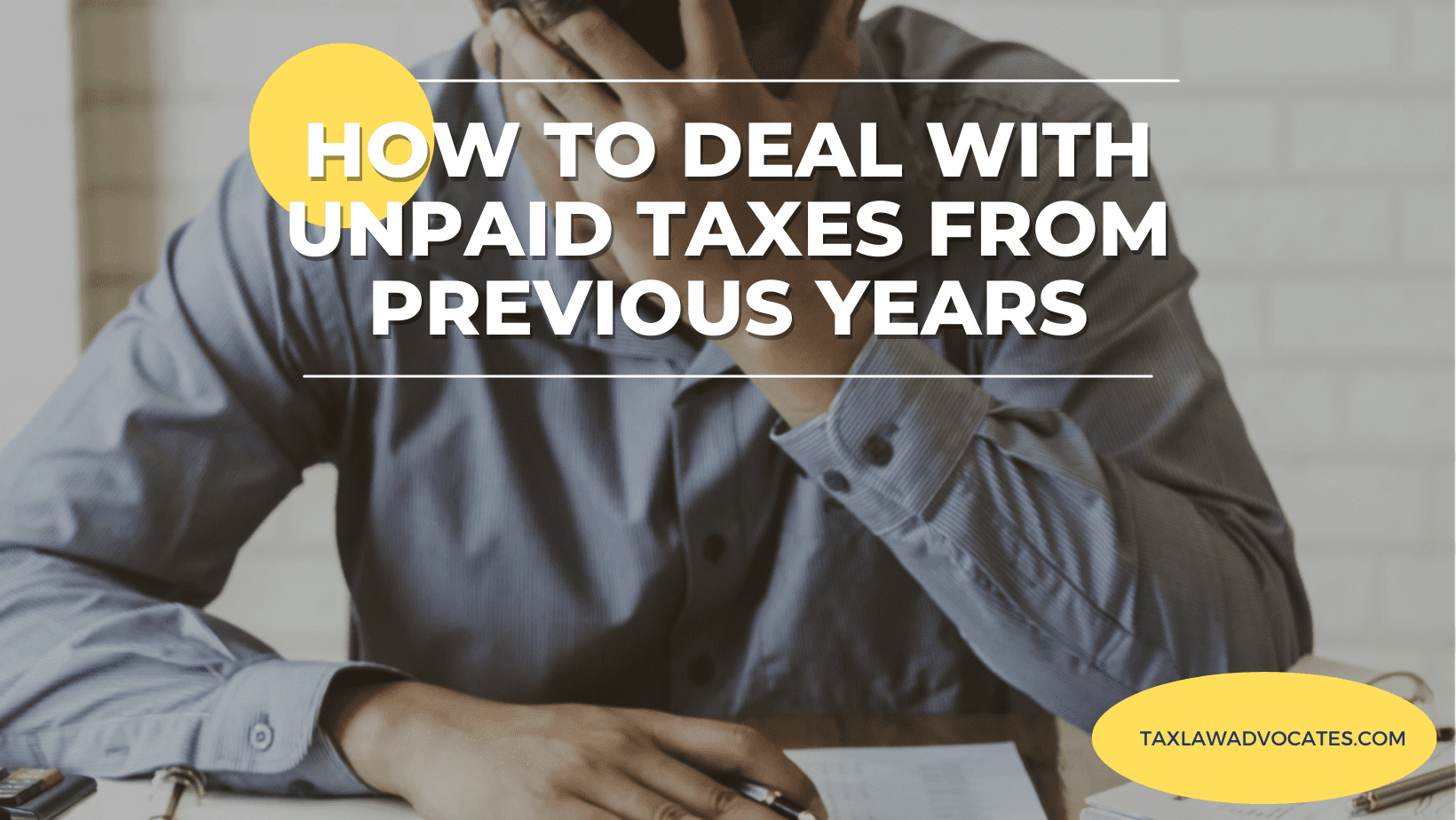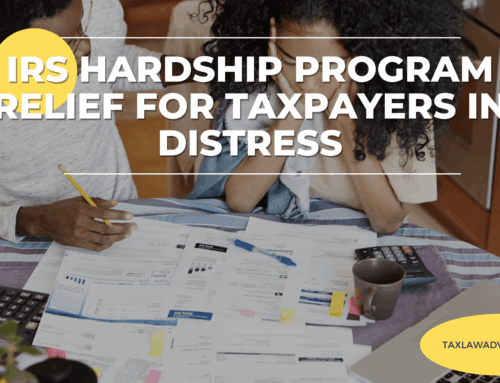If you have unpaid taxes from previous years, you’re not alone. Many taxpayers find themselves in this situation due to financial hardships, misunderstandings, or simple mistakes in tax filing. However, leaving these debts unresolved can lead to penalties, interest, wage garnishments, and even legal action from the IRS.
At Tax Law Advocates, we specialize in helping individuals and businesses resolve unpaid tax debt, negotiate with the IRS, and find solutions that prevent financial hardship. Whether you owe a small amount or a substantial balance, this guide will help you understand how to address unpaid taxes and avoid serious consequences.
Consequences of Unpaid Taxes
Before addressing how to resolve back taxes, it’s important to understand the potential consequences of ignoring them. The IRS has several methods to enforce collection, including:
- Penalties & Interest Accrual: The IRS imposes failure-to-file and failure-to-pay penalties, along with compounding interest, increasing the amount owed.
- Tax Liens: A federal tax lien is a legal claim against your property, which can impact your credit and ability to sell assets.
- Bank Levies & Wage Garnishments: The IRS can seize funds from your bank account or garnish wages if tax debt remains unpaid.
- Loss of Refunds & Future Tax Offsets: If you owe back taxes, the IRS may withhold future tax refunds to cover your balance.
- Legal Action: In extreme cases, criminal tax fraud investigations or civil lawsuits may be initiated against taxpayers who repeatedly ignore IRS notices.
If you’ve received IRS collection notices, acting quickly can prevent these enforcement actions.
Steps to Resolve Unpaid Taxes
1. Determine How Much You Owe
Before you can resolve your tax debt, you need to determine exactly how much you owe the IRS. To do this:
- Log in to the IRS Website: Visit the IRS.gov portal to access your tax records and balance.
- Call the IRS: The IRS has a dedicated helpline for individuals and businesses to request tax debt details.
- Review Past Tax Returns: If you haven’t filed certain returns, review your financial documents to estimate what you owe.
If you’re unsure where to start or how to interpret IRS records, Tax Law Advocates can help by requesting your account transcripts and breaking down the total amount due.
2. File Any Unfiled Tax Returns
Even if you can’t pay your balance immediately, filing all outstanding tax returns is critical. The IRS requires taxpayers to be current on filings before they will approve any payment plans or settlements.
Filing late tax returns can also:
- Reduce penalties (since failure-to-file penalties are higher than failure-to-pay penalties)
- Restore eligibility for tax refunds (if applicable)
- Prevent further IRS enforcement actions
If you need help filing back tax returns, our tax professionals can assist you in preparing accurate returns and ensuring compliance.
3. Explore Payment Options
Once your total balance is confirmed, it’s time to find a payment solution that works for your financial situation.
Option 1: IRS Installment Agreements (Payment Plans)
If you can’t afford to pay your tax debt in full, the IRS offers installment agreements that allow you to pay over time.
- Short-Term Plans: If you owe less than $100,000, you may qualify for a 180-day payment extension.
- Long-Term Installment Agreements: For balances up to $50,000, you can apply for a monthly payment plan.
- Partial Payment Installments: If you can’t pay the full amount, the IRS may accept reduced monthly payments based on your financial situation.
Our team at Tax Law Advocates can help negotiate a lower payment plan that fits within your budget.
Option 2: Offer in Compromise (Tax Settlement Program)
An Offer in Compromise (OIC) allows you to settle your tax debt for less than the full amount owed. However, the IRS only approves OIC requests for taxpayers who can prove financial hardship.
To qualify, you must show:
- Limited income & assets
- Inability to pay the full amount
- Compliance with all tax filing requirements
Tax Law Advocates specializes in Offer in Compromise applications and can maximize your chances of approval.
Option 3: Currently Not Collectible (CNC) Status
If you are experiencing extreme financial hardship, the IRS may pause collection efforts by placing your account in Currently Not Collectible (CNC) status. This means:
- The IRS won’t attempt to collect the debt while your hardship continues.
- No bank levies or wage garnishments will be issued.
- The balance remains, but collection is on hold until your financial situation improves.
If you believe you can’t afford to pay at this time, we can help you apply for CNC status.
4. Negotiate Tax Penalty Relief
Penalties and interest often make up a large portion of tax debt. However, the IRS offers penalty abatement programs for taxpayers who qualify.
Common penalty relief options include:
- First-Time Penalty Abatement: Available for those with a clean compliance history.
- Reasonable Cause Relief: If you experienced hardship, illness, or natural disaster, the IRS may waive penalties.
At Tax Law Advocates, we can help you request penalty relief and potentially reduce your overall tax liability.
5. Avoid Future Tax Debt
Once your back taxes are resolved, it’s crucial to avoid falling behind again. Steps to prevent future tax debt include:
- Adjust Your Withholdings: Ensure the correct amount is being withheld from your paycheck.
- Make Estimated Tax Payments: If self-employed, make quarterly tax payments to avoid a growing balance.
- Stay Current on Filings: Always file tax returns on time to avoid IRS penalties.
- Work with a Tax Professional: Ongoing tax planning can help you minimize tax liability and stay compliant.
How Tax Law Advocates Can Help
If you owe unpaid taxes from previous years, don’t wait for the IRS to take action. At Tax Law Advocates, we offer:
✅ IRS Debt Negotiation & Resolution – We handle IRS negotiations, payment plans, and tax settlements.
✅ Back Tax Return Filing – We prepare and file missing tax returns to restore compliance.
✅ Tax Relief Strategies – We help secure penalty relief, installment agreements, and hardship status.
✅ Legal Representation – We defend clients from IRS liens, levies, and garnishments.
Talk To Tax Law Advocates Today
Ignoring unpaid taxes can lead to severe financial consequences, but you have options. By filing past-due tax returns, negotiating a payment plan, or exploring tax relief programs, you can resolve your tax debt and avoid enforcement actions.
If you’re struggling with back taxes, call Tax Law Advocates today at 855-612-7777 for a confidential consultation. Our tax experts will create a customized plan to resolve your IRS debt and help you regain financial peace of mind.






